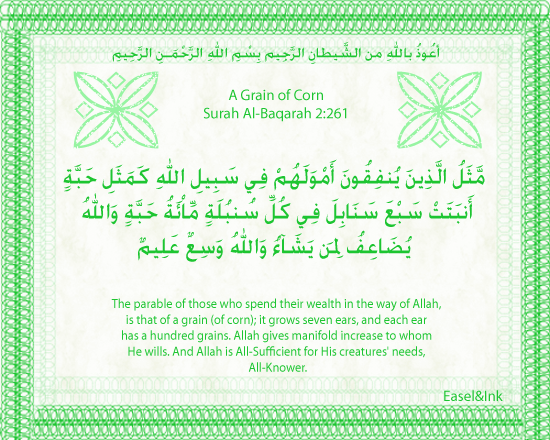Zaza
Librarian


Location : The Wonderful Art Garden
 |  Subject: A Grain of corn (Surah Al-Baqarah 2: 261) Subject: A Grain of corn (Surah Al-Baqarah 2: 261)  Tue May 12, 2009 1:38 pm Tue May 12, 2009 1:38 pm | |
| As Salamu Alaikum wa Rahmatullahi wa Barakatuhu Rewards of Spending in Allah's Cause This is a parable that Allah made of the multiplication of rewards for those who spend in His cause, seeking His pleasure. Allah multiplies the good deed ten to seven hundred times. Allah said, The parable of those who spend their wealth in the way of Allah...Sa`id bin Jubayr commented, "Meaning spending in Allah's obedience.'' Makhul said that the Ayah means, "Spending on Jihad, on horse stalls, weapons and so forth.'' The parable in the Ayah is more impressive on the heart than merely mentioning the number seven hundred. This Ayah indicates that Allah `grows' the good deeds for its doers, just as He grows the plant for whoever sows it in fertile land. The Sunnah also mentions that the deeds are multiplied up to seven hundred folds. For instance, Imam Ahmad recorded that Abu Mas'ud (Radhi Allahu Anhu) said that a man once gave away a camel, with its bridle on, in the cause of Allah and the Messenger of Allah (Sallallahu Alayhi wa Sallam) said, On the Day of Resurrection, you will have seven hundred camels with their bridles. Muslim and An-Nasa'i also recorded this Hadith, and Muslim's narration reads, "A man brought a camel with its bridle on and said, `O Messenger of Allah! This is in the sake of Allah.' The Messenger (Sallallahu Alayhi wa Sallam) said, You will earn seven hundred camels as reward for it on the Day of Resurrection. Another Hadith: Ahmad recorded that Abu Hurayrah said that the Messenger of Allah (Sallallahu Alayhi wa Sallam) said, Every good deed that the son of Adam performs will be multiplied ten folds, to seven hundred folds, to many other folds, to as much as Allah wills. Allah said, "Except the fast, for it is for Me and I will reward for it. One abandons his food and desire in My sake.'' The fasting person has two times of happiness: when he breaks his fast and when he meets his Lord. Verily, the odor that comes from the mouth of whoever fasts is more pure to Allah than the scent of musk. Fasting is a shield (against sinning), fasting is a shield. Muslim recorded this Hadith. Allah's statement, Allah gives manifold increase to whom He wills is according to the person's sincerity in his deeds. And Allah is All-Sufficient for His creatures' needs, All-Knower meaning, His Favor is so wide that it encompasses much more than His creation, and He has full knowledge in whoever deserves it, or does not deserve it. All the praise and thanks are due to Allah. Reference: Tafsir ibn Kathir (abridged) English version. | |
|









 Please check our
Please check our 




